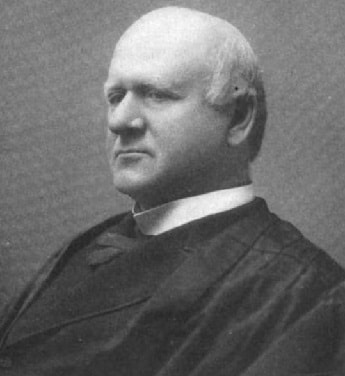Introduction - Plessy vs Ferguson
Plessy v. Ferguson was one of the most important court cases in black history. The 1896 United States Supreme Court decision in this case upheld the legality of state
laws that required racial segregation in public facilities known as the "separate but equal" doctrine. This decision would allow for racial discrimination based on
separation of the races to continue for decades until finally changed by the Supreme Court's decision in the Brown v. Board of Education 1954 case which overruled the
decision in the Plessy vs Ferguson case.
Click here for a great selection of Amazon.com
books about the Plessy vs Ferguson case.
On this page is a list of interesting facts about this famous case, a summary, including answers to the questions who is Homer Plessy, who won the case, why the Supreme Court made the decision it did, and how the court decision effected the fight for black civil rights. Whether you are a kid writing a paper for Black History Month or are just interested in information about this case you should these facts helpful.
Background Plessy vs Ferguson Court Case
- In 1890 a law titled The "Separate Car Act" was passed in the state of Louisiana. This law required separate railway cars for black and white train passengers.
- A group of black and white citizens of New Orleans, Louisiana formed a group called the Committee of Citizens in order to fight this law and get it repealed by the courts.
- The Committee of Citizens persuaded Homer Plessy to violate the law for the purpose of getting arrested so that a court case would begin where the "Separate Car Act" law could be challanged. Homer Plessy was an "octoroon", meaning he was seven-eighths white and one-eighth black, and classified as black by the State of Louisiana.
- On June 7, 1892 Homer Plessy boarded a "whites only" car in New Orleans and refused to leave when asked to move to the blacks-only car.
- An interesting fact is that the railroad company itself was opposed to separate cars for black people due to the high cost required to purchase additional railcars. The Committee of Citizens group, thinking ahead, had hired a private detective with the legal right to arrest violators of laws; in case the railroad did not take action when Plessy refused to leave the whites-only car. The Committee and Plessy wanted an arrest so that a court case could begin.
- The private detective hired by the Committee of Citizens arrested Plessy, as was the plan.
Interesting Plessy vs Ferguson Court Case Facts
- Plessy's lawyers prepared his defense based on the fact that Louisiana's "Separate Car Act" law mandating the separation of black passengers from white passengers denied Plessy his Constitutional rights under the 13th and 14th amendments of the U.S. Constitution.
- In the first case, Homer Adolph Plessy v. The State of Louisiana, Plessy lost and was required to pay a small fine. The judge in this case was John Howard Ferguson whose name would later be on the Supreme Court Case in this matter.
- This court case then went to the Supreme Court of Louisiana which upheld the lower court's decision against Plessy.
- The Committee of Citizens appealed the case to the United States Supreme Court and beginning in April of 1896 the US Supreme Court heard the case.
- The United States Supreme Court ruled against Plessy stating that the Louisiana "Separate Car Act" law did not discriminate against blacks and therefore was not a violation of Plessy's rights under the 14th amendment of the U.S. Constitution.
- The court noted that the quality of Louisiana's whites-only and blacks-only railway cars were equal. This may have been true but the decision perpetrated separate facilities, including public bathrooms, restaurants, and public schools most of which were far inferior for black people.
- The one dissenting judge, John Marshall Harlan, perhaps summed up the injustice of the decision best with his statement "our constitution is color-blind.... the law regards man as man, and takes no account of his surroundings or of his color when his civil rights as guaranteed by the supreme law of the land are involved."
- The Plessy vs Ferguson decision would eventually be overruled a long 58 years later with the Brown v. Board of Education decision in 1954.
